 California may be a progressive state. But when it comes to election recount laws, we remain in democracy's dark ages.
California may be a progressive state. But when it comes to election recount laws, we remain in democracy's dark ages.
In 2012, I requested the first ever recount for a statewide ballot measure (Proposition 29) in California state history. I later advised statewide recounts for Proposition 37 in 2012 and the Controller's race in 2014. I helped Assemblyman Kevin Mullin craft 2014 legislation allowing a taxpayer-funded recount for any statewide contest with a margin "less than or equal to the lesser of 1,000 votes or 0.00015 percent."
That legislation was very narrow and did not mandate automatic recounts for Congressional races. This past May, the Santa Clara and San Mateo County Registrars certified March 5th's U.S. House primary race as a tie for second place between Evan Low and Joe Simitian which, in some states, triggers an automatic recount. In California, however, current law indicated that both Low and Simitian would advance, with first-place finisher, Sam Liccardo to the first Top-THREE general election in California's history. (Since 2010, the state has held Top-Two primaries, where candidates from all parties run against each other in the primary and the two top vote-getters advance to the general, regardless of party. In this case, all three candidates are Democrats running in a very liberal leaning part of the state.)
Instead of all three men advancing, however, a voter named Jonathan Padilla stepped forward to request a hand recount --- as any voter is allowed to under state law, assuming they are willing to pay for it. The law also requires that requestors name the candidate on whose behalf they are seeking the recount. Though neither Low nor his campaign was involved in the request, Padilla cited him as the candidate on whose behalf he was seeking the new count. He did so with the expectation, per California law, that the money would be refunded if the final outcome of the election changed to benefit Low.
After being presented with an initial estimate that a hand recount could cost as much as $500,000, Padilla sought a less-expensive machine count, which, in the past, have been proven to be less accurate...
After the 15-day count, Low was ultimately declared the sole second-place finisher over Simitian by 5 votes, revealing that the initial certification of a tie for the second place spot was in error. Other problems were discovered along the way. For example, 25 previously challenged ballots were added to the tally in both San Mateo and Santa Clara. A dozen ballots that had gone uncounted, due to human error, were also added to the totals, along with several ballots initially excluded due to legal questions about them. All relatively small errors, but in a race as close as this one (a tie!), they are anything but small.
In retrospect, the Registrars could have undertaken a recount on their own and shared the findings of errors publicly to strengthen election integrity. Curiously, after the recount had begun, the Secretary of State ruled the requestor would not be entitled to a refund. The office concluded that either eventual second place winner following a recount would have advanced to the general election either way.
But, echoing similar language in California's Election code, the Santa Clara Registrar website states: "if the outcome of the recount has changed the election results in the requestor's favor, the [money paid for the recount] is returned."
I believe the Secretary of State has misinterpreted the law and both county Registrars should issue a refund to Padilla, as it is clearly to Low's advantage to now face only one opponent, rather than two.
Additionally, as The BRAD BLOG has detailed over the years, exorbitant and seemingly arbitrary recount costs in California have become a deterrent to democracy. During the Prop 29 recount, costs for hand-counts in Los Angeles, Placer, Orange, and Sacramento Counties, as determined by each County's Registrar, ranged wildly from 29 cents to $3.84 per ballot. During the Prop 37 recount, one Registrar requested $58,000 before a single ballot would be recounted. If the Low-Simitain tie had occurred in Orange County, the cost for a hand recount would only have been around $50,000 --- an order of magnitude less than the cost of recounting in Santa Clara.
From media reports, the final cost for the Low-Simitian count was $1.64 per ballot. But this was for a less accurate, less transparent machine tally. In 2012, in the Prop 29 recount in L.A., 48,000 ballots were machine recounted in two days for just $26,000 before being hand recounted as well. Projecting that Prop 29 machine recount cost to this year's CD-16 race with nearly 182,000 ballots cast, the cost should only have been around $100,000, rather than the more than $300,000 charged to Padilla as reported in the press. It is also worth noting that in L.A., after nearly 90,000 ballots were hand recounted in 2012, almost 800 votes were found to have been missed in the initial machine count (a nearly 1% error rate).
As a guest on the May 13th BradCast this year, I discussed with Brad how the initial certification of a tie in the CD-16 primary was an error threatening our democracy, and an illustration of why so many have lost confidence in our election officials. The mistakes ultimately discovered during the recount only highlight further the desperate need for recount reform in California. Allowing any citizen to seek a recount under state law is welcome. But it is baffling that a private citizen must personally bear the financial costs to ensure that Registrars have done the job properly even in the closest of races --- in this case, a contest that was so close it was initially (and inaccurately) said to have been tied!
A number of November 2024 elections are anticipated to be close here in the Golden State, with control of the U.S. House potentially in the balance. It took nearly 2 months to know the true outcome in the CD-16 U.S. House primary race. Two months after the November 5, 2024 Presidential election will be January 5, 2025, and our nation may not survive a repeat of the January 6, 2021 mayhem.
To restore confidence in our elections, recount laws must be reformed by the State Legislature before it is too late. Variable recount costs are unfair to both candidates and voters and should be standardized. State-financed recounts should automatically be triggered in close races, as required in more than 20 other states. Assemblymember (and potential future Congressman) Evan Low has introduced legislation in Sacramento to expand Kevin Mullin's legislation to include all races where the candidates are separated by less than 25 votes or by 0.25% of the ballots cast. That is the very least of recount reforms we need from state officials --- and sooner, rather than later. In 2024, now more than ever, our democracy has no room for error.
 John Maa is a general surgeon in San Francisco. He requested the first statewide recount in California history in 2012 and has advised various organizations and campaigns on recounts in the ensuing years. He also previously served as a National Finance Committee Member of the Democratic National Committee. Follow him on twitter: @JohnMaaMD
John Maa is a general surgeon in San Francisco. He requested the first statewide recount in California history in 2012 and has advised various organizations and campaigns on recounts in the ensuing years. He also previously served as a National Finance Committee Member of the Democratic National Committee. Follow him on twitter: @JohnMaaMD


 Jack Smith Testimony on Trump J6 Crimes, DOJ Weaponization: 'BradCast' 1/6/26
Jack Smith Testimony on Trump J6 Crimes, DOJ Weaponization: 'BradCast' 1/6/26 'Green News Report' 1/6/26
'Green News Report' 1/6/26
 Trump's War on Venezuela is About Ego, Power, Creation of 'Alien Enemies': 'BradCast' 1/5/26
Trump's War on Venezuela is About Ego, Power, Creation of 'Alien Enemies': 'BradCast' 1/5/26 Sunday 'Peace President' Toons
Sunday 'Peace President' Toons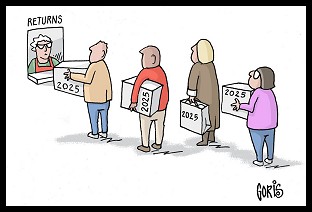 Sunday 'Many Happy Returns' Toons
Sunday 'Many Happy Returns' Toons Have a Holly Jolly Somehow
Have a Holly Jolly Somehow 'Tis the Sunday Before Christmas Toons
'Tis the Sunday Before Christmas Toons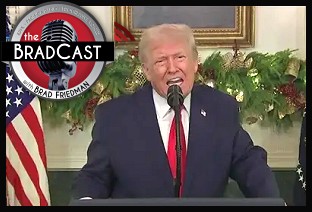 Old Man Shouts at People from White House for 20 Minutes, and Other Year-End Matters: 'BradCast' 12/18/25
Old Man Shouts at People from White House for 20 Minutes, and Other Year-End Matters: 'BradCast' 12/18/25 'Green News Report' 12/18/25
'Green News Report' 12/18/25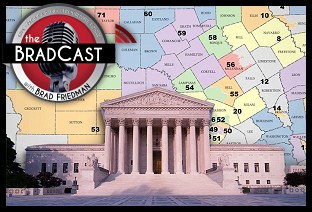 SCOTUS Ruling a How-To for Unlawful Gerrymandering on 'Eve' of Critical Election Year: BradCast' 12/17/25
SCOTUS Ruling a How-To for Unlawful Gerrymandering on 'Eve' of Critical Election Year: BradCast' 12/17/25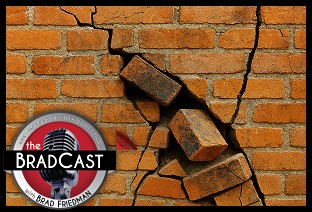 Bricks in the Wall: 'BradCast' 12/16/25
Bricks in the Wall: 'BradCast' 12/16/25 'Green News Report' 12/16/25
'Green News Report' 12/16/25 'This One Goes to 11': Weekend of Violence, Murder of Rob Reiner: 'BradCast' 12/15
'This One Goes to 11': Weekend of Violence, Murder of Rob Reiner: 'BradCast' 12/15 Sunday 'WTF?' Toons
Sunday 'WTF?' Toons Trump Now Losing One Battle After Another: 'BradCast' 12/11/25
Trump Now Losing One Battle After Another: 'BradCast' 12/11/25 'Green News Report' 12/11/25
'Green News Report' 12/11/25 Dems Continue Stunning 2025 Election Streak: 'BradCast' 12/10/25
Dems Continue Stunning 2025 Election Streak: 'BradCast' 12/10/25 Petrostates and Propa-gandists Undermining Climate Science: 'BradCast' 12/9/25
Petrostates and Propa-gandists Undermining Climate Science: 'BradCast' 12/9/25 The High Cost of Trump's Terrible Policy Making: 'BradCast' 12/8/25
The High Cost of Trump's Terrible Policy Making: 'BradCast' 12/8/25 Dems Fight to Avoid GOP's Year-End Health Care Cliff: 'BradCast' 12/4/25
Dems Fight to Avoid GOP's Year-End Health Care Cliff: 'BradCast' 12/4/25 A 'Flashing Red Warning Sign' for GOP: 'BradCast' 12/3/25
A 'Flashing Red Warning Sign' for GOP: 'BradCast' 12/3/25 Hegseth, War Crimes and DoD's 'Politicization Death Spiral': 'BradCast' 12/2/25
Hegseth, War Crimes and DoD's 'Politicization Death Spiral': 'BradCast' 12/2/25 Follow the
Follow the 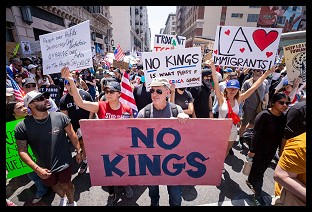 With Thanks, No Kings and Good Cheer
With Thanks, No Kings and Good Cheer
 VA GOP VOTER REG FRAUDSTER OFF HOOK
VA GOP VOTER REG FRAUDSTER OFF HOOK Criminal GOP Voter Registration Fraud Probe Expanding in VA
Criminal GOP Voter Registration Fraud Probe Expanding in VA DOJ PROBE SOUGHT AFTER VA ARREST
DOJ PROBE SOUGHT AFTER VA ARREST Arrest in VA: GOP Voter Reg Scandal Widens
Arrest in VA: GOP Voter Reg Scandal Widens ALL TOGETHER: ROVE, SPROUL, KOCHS, RNC
ALL TOGETHER: ROVE, SPROUL, KOCHS, RNC LATimes: RNC's 'Fired' Sproul Working for Repubs in 'as Many as 30 States'
LATimes: RNC's 'Fired' Sproul Working for Repubs in 'as Many as 30 States' 'Fired' Sproul Group 'Cloned', Still Working for Republicans in At Least 10 States
'Fired' Sproul Group 'Cloned', Still Working for Republicans in At Least 10 States FINALLY: FOX ON GOP REG FRAUD SCANDAL
FINALLY: FOX ON GOP REG FRAUD SCANDAL COLORADO FOLLOWS FLORIDA WITH GOP CRIMINAL INVESTIGATION
COLORADO FOLLOWS FLORIDA WITH GOP CRIMINAL INVESTIGATION CRIMINAL PROBE LAUNCHED INTO GOP VOTER REGISTRATION FRAUD SCANDAL IN FL
CRIMINAL PROBE LAUNCHED INTO GOP VOTER REGISTRATION FRAUD SCANDAL IN FL Brad Breaks PA Photo ID & GOP Registration Fraud Scandal News on Hartmann TV
Brad Breaks PA Photo ID & GOP Registration Fraud Scandal News on Hartmann TV  CAUGHT ON TAPE: COORDINATED NATIONWIDE GOP VOTER REG SCAM
CAUGHT ON TAPE: COORDINATED NATIONWIDE GOP VOTER REG SCAM CRIMINAL ELECTION FRAUD COMPLAINT FILED AGAINST GOP 'FRAUD' FIRM
CRIMINAL ELECTION FRAUD COMPLAINT FILED AGAINST GOP 'FRAUD' FIRM RICK SCOTT GETS ROLLED IN GOP REGISTRATION FRAUD SCANDAL
RICK SCOTT GETS ROLLED IN GOP REGISTRATION FRAUD SCANDAL VIDEO: Brad Breaks GOP Reg Fraud Scandal on Hartmann TV
VIDEO: Brad Breaks GOP Reg Fraud Scandal on Hartmann TV RNC FIRES NATIONAL VOTER REGISTRATION FIRM FOR FRAUD
RNC FIRES NATIONAL VOTER REGISTRATION FIRM FOR FRAUD EXCLUSIVE: Intvw w/ FL Official Who First Discovered GOP Reg Fraud
EXCLUSIVE: Intvw w/ FL Official Who First Discovered GOP Reg Fraud GOP REGISTRATION FRAUD FOUND IN FL
GOP REGISTRATION FRAUD FOUND IN FL

































